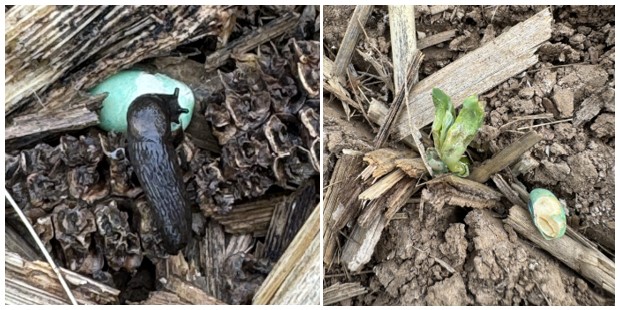Implementing a program for the management of mollusks in soybeans
Implementing a program for the management of mollusks in soybeans
Published on Apr. 14, 2025

Principle Investigator: Raul Villanueva
National Research Service/National Institute of Food and Agriculture
Mollusk outbreaks had been observed in commercial soybean and corn fields of Kentucky with higher frequency and intensity in recent years than in the past. In 2017, approximately 150,000 acres of commercial soybeans were replanted due to slug damage; this represented approximately 10% of the total soybean acreage planted in KY that year and an estimated 5.5 million dollars on seed expenditures for replanting without considering labor. In 2021, this event was repeated and in 2022 an outbreak of snails caused havoc in a 200-acre farm in Lyon County in spite of a severe drought in the state that year. During these event some farmers replanted up to four times in several counties (i.e., Lyon, Caldwell, Henderson, Daviess) due to the substantial slug damage. Farmers are starting to use molluscicides although these are not registered in Kentucky in comparison to adjacent states such as TN or IL. Carabid ground beetles will also be part of these studies to identify species and predatory species that may play an important role reducing mollusk populations. To understand and provide solutions to this problem, this project will conduct studies in research plots, and bioassays at the University of Kentucky’s Research and Education Center at Princeton as well as in commercial farms that have recurrent problems with mollusks. The objectives pursued in this study are:
(1) To identify and evaluate species of mollusks present in soybean fields and their carabid natural enemies.
(2) to study management tactics to reduce mollusk damage in soybean fields, and
3) to transfer all information generated in this study to end users through the use of digital, and printed media, and their delivery in extension field days and conferences.
Entomology PSS
